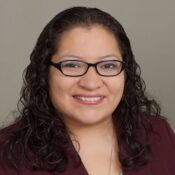Critical Elements of Mentoring for Latinx Undergraduates: Effective Mentoring to Enhance Persistence and Retention
Day 2: November 15, 2022 | 2:00 p.m. – 3:15 p.m., Northwoods Room
Session Video
Session Materials
- Presentation: Critical Elements of Mentoring for Latinx Undergraduates: Effective Mentoring to Enhance Persistence and Retention (PDF)
Session Description
Although higher education institutions are becoming more reflective of the increasingly diverse U.S. population, there remains a substantial achievement gap between Black, Indigenous and other students of color and their white counterparts (McElrath & Martin, 2021). Over the last 14 years (2005-2019), the percentage of Latinx individuals 25 years and older has increased by less than 4% (12.6 to 16.4) (McElrath & Martin, 2021). Yet, Latinx undergraduates continuously succeed, persist, and graduate, with mentorship consistently and positively influencing their educational experience (Castellanos & Gloria, 2007; Delgado-Guerrero, 2016). This presentation draws from a large qualitative and quantitative study to overview the critical dimensions of the mentoring relationship with and for Latinx undergraduates.
Using the Psychosociocultural Framework (Gloria & Rodriguez, 2000) to explore mentorship experiences, emergent themes were identified within the domains of the Undergraduate Mentoring Model (Nora & Crisp, 2007) and academic persistence. The domains included: 1) psychological and emotional support, 2) goal setting and career paths, 3) academic subject knowledge support, 4) the existence of a role model, and 5) academic persistence. This session will discuss research findings (i.e., emergent themes) and implications for individuals who mentor Latinx undergraduates and universities wanting to implement mentoring programs.
This session will help participants:
- Define and understand critical psychosociocultural (PSC) mentoring dimensions with Latinx students
- Engage with current narratives of Latinx mentoring experiences
- Reflect on participants’ current mentoring practices with Latinx students
- Develop an increased understanding of Latinx students’ mentoring needs to implement within effective mentoring programs
Speakers
Marla Delgado-Guerrero
Marla Delgado-Guerrero, Ph.D., is the newly appointed director of the UW Posse program. She earned her Ph.D. in counseling psychology, her master’s in counseling, and her bachelor’s in journalism with a Chican@/Latin@ Studies certificate from UW–Madison. She served as a mental health practitioner, diversity affairs professional and adjunct assistant professor at Marquette University before returning to UW–Madison. Dr. Delgado-Guerrero’s dissertation on mentorship was awarded second-place honors in the AAHHE/ETS Outstanding Dissertation Competition through the American Association of Hispanics in Higher Education in 2018. As a testament to her advocacy for underrepresented students, she was named to the “2019 Si Se Puede: Wisconsin’s Most Powerful Latinos” list and presents on mental health and student success in BIPOC communities at local, state and national events.
Alberta M. Gloria
Alberta M. Gloria, Ph.D., is a professor of counseling psychology at the UW–Madison School of Education, where she focuses on the educational processes and coping strategies that facilitate academic persistence and educational wellness for Black, Indigenous and other students of color. Professor Gloria’s mentoring and scholarship implement the psychosociocultural approach to persistence in which the whole student is considered within the context of the university environment. Central to her work is the concept of creation and maintenance of “academic families,” in which students find cultural congruity, personal and professional reflection and validation, and dimensionalized connections to persist within their educational contexts.

